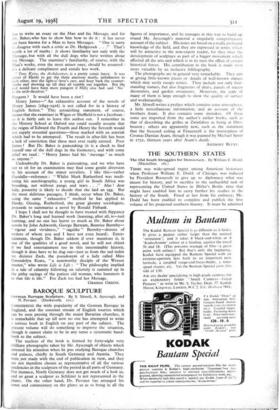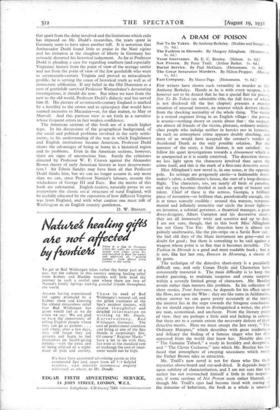THE SOUTHERN STATES
The Old South Struggles for Democracy. By William E. Dodd. (Macmillan. 16s.)
Timm was wide-spread regret among American historians when Professor William E. Dodd, of Chicago, was induced by President Roosevelt to give up to diplomacy what was meant for history, and to sacrifice to the unthankful task of representing the United States in Hitler's Berlin time that might have enabled him to carry further his studies in the history of the South. Freed at last from his embassy, Mr. Dodd has been enabled to complete and publish the first volume of his projected southern history. It must be admitted
that apart from the delay involved and the limitations which exile has imposed on Mr. Dodd's researches, the years spent in Germany seem to have taken another toll. It is notorious that Ambassador Dodd found little to praise in the Nazi regime and his irritation at the slaughter of liberty in Germany has seriously distorted his historical judgement. As far as Professor Dodd is pleading a case for regarding southern (and especially Virginian) history from the point of view of the average settler and not from the point of view of the few gentlefolk who went to seventeenth-century Virginia and proved so miraculously prolific, he is serving the cause of historical truth as well as of democratic edification. If any belief in the Old Dominion as a nest of gentlefolk survived Professor Wertenbaker's devastating investigations, it should die now. But when we turn from the new to the old world, Professor Dodd's didactic zeal has served him ill. His picture of seventeenth-century England is marked by a hostility to the crown and to episcopacy that would have seemed excessive to Macaulay—or, for that matter, to May or Marvell. And this partisan view is set forth in a narrative whose frequent errors in fact weaken confidence.
The American sections of this book are of a much higher type. In his discussions of the geographical background, of the social and political problems involved in the early settle- ments, in his understanding of the way in which Englishmen and English institutions became. American, Professor Dodd shows the advantages of being at home in a historical region and its problems. Even in the American sections, however, there are signs of unconscious bias. Surely the criticisms directed by Professor W. F. Craven against the Alexander Brown theory of early American history at least deserve men- tion ? Sir Edwin Sandys may have been all that Professor Dodd thinks him, but we can no longer assume it, any more than we can, since Professor Namier's labours, assume the wickedness of George III and Bute. But the merits of this book are substantial. English readers, naturally prone to see everywhere the classic social structure of rural England, will be usefully educated by the exposition of how different Virginia was from England, and with what caution one must talk of Washington as an English country gentleman.
D._ W. -BROGAN.







































 Previous page
Previous page